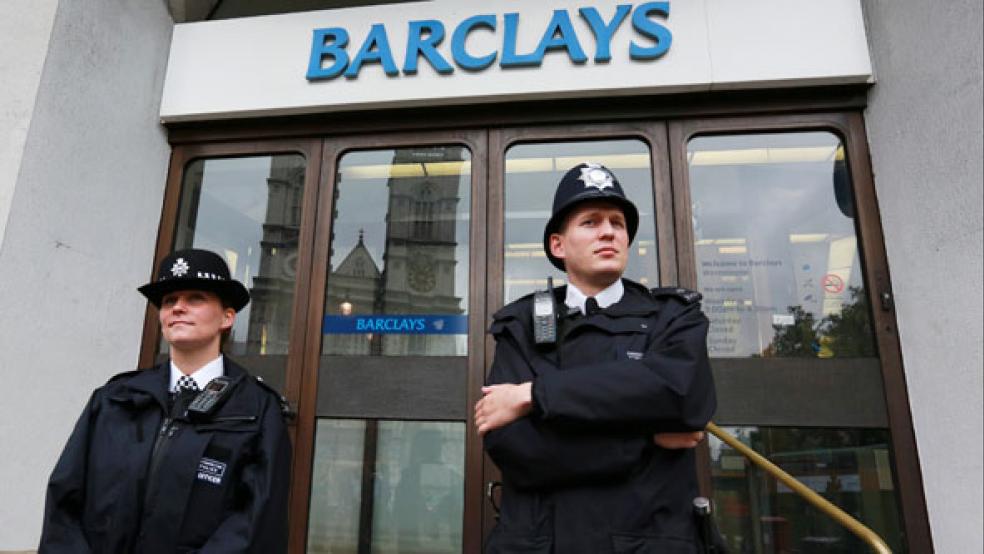How much lower can the banking sector sink? Since the start of the financial crisis, the industry has been beset by one scandal after another, with seemingly every major institution tainted by embarrassing missteps or shocking wrongdoing. Regulators and even smaller banks have their share of black eyes as well.

It’s no surprise, then, that the financial sector has seen its status slide. After an uptick in reputitional ratings in 2011, 22 of 30 large banks saw their scores fall in an annual survey published in the July issue of American Banker Magazine. And even banks that fared relatively well, like ING Direct and Bank of the West, scored less than 70 on a 100-point scale—below the level that would indicate a strong corporate reputation. "All the ground that the industry gained a year ago was given back over the past year," says Heather Landy, the magazine's editor in chief.
The American Banker survey was conducted in January and February – before JPMorgan Chase’s $5.8 billion trading loss first made news; before Moody’s downgraded the credit ratings of 15 big global banks, including five here in the U.S.; before Barclays admitted to manipulating a benchmark interest rate in a scandal that could still cost other banks millions or billions; before HSBC executives were excoriated by the Senate for ignoring warnings about drug cartels and terrorist financiers using the bank to launder money. A Gallup poll conducted in early June found that the public’s confidence in U.S. banks had fallen to a record low 21 percent, down from 53 percent in 2005. Only Congress (13 percent) and Health Maintenance Organizations (19 percent) fared worse, while television news, organized labor and big business all got the same 21 percent trust.
But the perception of banks has fallen further than of any of those other institutions. “U.S. banks have seen the greatest decline in confidence of any institution relative to its historical average,” Dennis Jacobe, Gallup’s chief economist, wrote last month.
Another recent survey provided some more evidence that our lack of trust is well deserved. The survey of 500 financial services professionals in the U.S. and U.K., conducted on behalf of law firm Labaton Sucharow, found that 26 percent said they “had observed or had firsthand knowledge of wrongdoing in the workplace.”
And the financial professionals tended to associate success with cheating; 39 percent believe that it’s likely that their competitors who have succeeded did so by bending or breaking the rules.
Even more troubling, 24 percent said they thought that the rules may need to be broken in order to be successful – and 16 percent said they would commit insider trading in order to make $10 million if they could get away with it. (On this last item, the survey found a wide gender split, with 19 percent of men saying they would engage in insider trading compared to 10 percent of women.) And regulators don’t scare them: Only one in four believe the authorities that oversee them are effective.
Money, of course, is a powerful motivator for bankers’ bad behavior – nearly a third of those surveyed said they felt pressure because of their bonus or pay plans to break the law or act unethically. Financial incentives may go a long way toward explaining the London Whale's bungled bet on credit derivatives or why Barclays traders asked others at the bank to report artificially high or low interest rate numbers. But can it really explain the lapses at HSBC?A Senate report released this week detailed how lax enforcement of anti-money laundering safeguards at HSBC allowed abuses of the U.S. financial system. The Senate subcommittee used HSBC as a “case study” in how the U.S. segment of a global financial institution “can become a sinkhole of risk for an entire network of bank affiliates and their clients around the world playing fast and loose with U.S. banking rules.” Is greed what drove the bank to ignore billions coming from drug traffickers or to work with Middle Eastern banks with links to terrorism?
“With the benefit of hindsight, it is now clear to many of us that the bank’s business and risk profile grew faster than its infrastructure,” David Bagley, the head of compliance at HSBC since 2002, told a Senate subcommittee on Tuesday. “The bank underestimated some of the challenges presented by its numerous acquisitions, and despite efforts to meet these challenges, we were not always able to keep up.” Bagley resigned during his testimony.
His piece, titled “Do Business Schools Incubate Criminals?,” argues that universities encourage amorality by the way they teach ethics to MBA students: “The way to teach these ethics is not to set up a separate class in which a typically low-ranking professor preaches to students who would rather be somewhere else. This approach, common at business schools, serves only to perpetuate the idea that ethics are only for those students who aren’t smart enough to avoid getting caught.”
Zingales acknowledges that changing the curriculum won’t entirely solve the problem. But, he writes, “The daily scandals that expose corruption and deception in business are not merely the doing of isolated crooks. They are the result of an amoral culture that we – business-school professors – helped foster. The solution should start in our classrooms.”
Instead, business leaders learn to maximize their profits and their financial rewards, something banks and their executives have tried to do in the wake of the financial crisis. “The reality is that U.S. banks are much stronger now than they were during the financial crisis in 2008 and 2009,” Gallup’s Jacobe wrote.
That’s certainly true, but as JPMorgan Chase, Goldman Sachs, Citigroup and other banks have reported their quarterly earnings in recent days, it’s also clear that they continue to face plenty of pressure. And if they continue to respond to the challenges they face in the same ways they have in recent years, their reputations – and our financial system – will bear the consequences.



